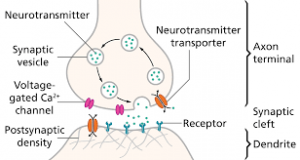Lauri Nummenmaa has done research the connects obesity to the brain. This research shows that people struggling with obesity have a lower amount of μ-opioid receptors available for binding in the brain. (To learn more about μ-opioid receptors click here.) Due to evolution, our brains are still “wired” to search for food and nutrients. Since eating gives off a sensation in the brain, related to the opioid receptors, people with fewer receptors that are able to bind will therefore eat more to make up for the loss in sensation. This reaction is the same as a reaction to an addiction would be, causing more neurotransmitters to be secreted. The next step that scientists are taking is to discover whether being obese causes a lack in opioid receptors, or if a lack in opioid receptors, caused by another source, is what causes obesity. One test that scientists did was testing μ-opioid receptors in people that had bariatric surgery. Bariatric surgery causes more receptors to work again, shown by the fact that scientists could not distinguish between the μ-opioid receptors or healthy people and the μ-opioid receptors of people who had the surgery.
Some body fat, however, is helpful to the brain. This article describes that “fat tissue in the bodies of mice releases an extracellular form of nicotinamide phosphoribosyltransferase (eNAMPT), an enzyme that travels to the hypothalamus, and gives animals energy during fasting.” (To learn more about eNAMPT click here.)
This photo shows how a neurotransmitter is sent from neuron to neuron generally.



Leave a Reply